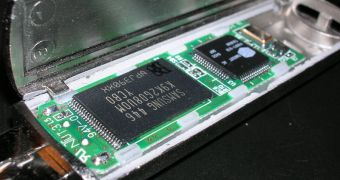Two renowned companies have recently announced their co-developing of a new super-fast NAND (non-volatile computer memory) flash chip. Comparing it to a car, this here is the Bugatti Veyron in flesh. Well, in solid flesh. Actually, it's just solid. Intel and Micron's partnership is to bring the fastest reading and writing NAND flash chip ever developed (for the professional market).
The new high-speed NAND flash chip is said to read up to 200 Megabytes per second and write 100 Megabytes/second, as compared to Single-Level-Cell Flash memory which reads at around 40 Megabytes per second and writes at just 20 Megabytes in the same amount of time.
Reportedly, mass production of the high speed SSD based on the new technology should begin by the end of 2008. The two aforementioned companies are set to ship a rather small 8GB model - probably to see if it catches on. The drive is targeted at the professional market.
Now, according to macrumors.com, general consumers of SSD-enabled devices are benefiting from a price drop of as much as 75% starting August 2007, as conventional NAND flash has since been falling considerably. Apple of course was among the companies that saw an opportunity to employ new tech into its systems, and so the MacBook Air - SSD version was born. The PC vendor however still charges a lot for this option with its latest notebook ($3,000).
Price drops in SSD flash should however translate to Apple's other products based on it, such as the iPod Touch and iPhone, according to the same source, which will probably translate yet again into another price reduction, this time for the iPhone and iPod touch themselves.
Flash memory is non-volatile. It does not need power to maintain the information stored in the chip. Flash memory also offers better kinetic shock resistance than hard disk drives and, when packaged in a memory card, it is considerably more durable. It can withstand intense pressure, extreme temperatures and even immersion in water. That of course doesn't mean that you can go scuba diving with your Macbook Air.

 14 DAY TRIAL //
14 DAY TRIAL //